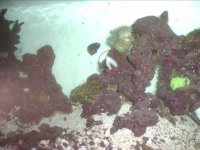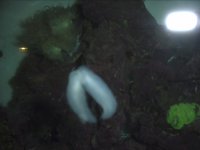Doodlehead
New Reefer
I found these in my tank recently and I am wondering if they are bad news. They are not your common red flatworm (I have those too). They are about 1.5 inches long (or 4-5cm), white on the bottom, and sandy brown on top. I know there are at least three. They like to hide on my branching torch coral (I hope they are not eating it), and when intertwined with it are almost invisible beacuse they match the color almost perfectly. I haven't seen them on any other corals though. Last night I saw these two going through some kind of mating ritual and laying eggs. Just wondering if I should get them out or not. Here are some pics. I did the best I could taking a pic at night with a cheap camera.







